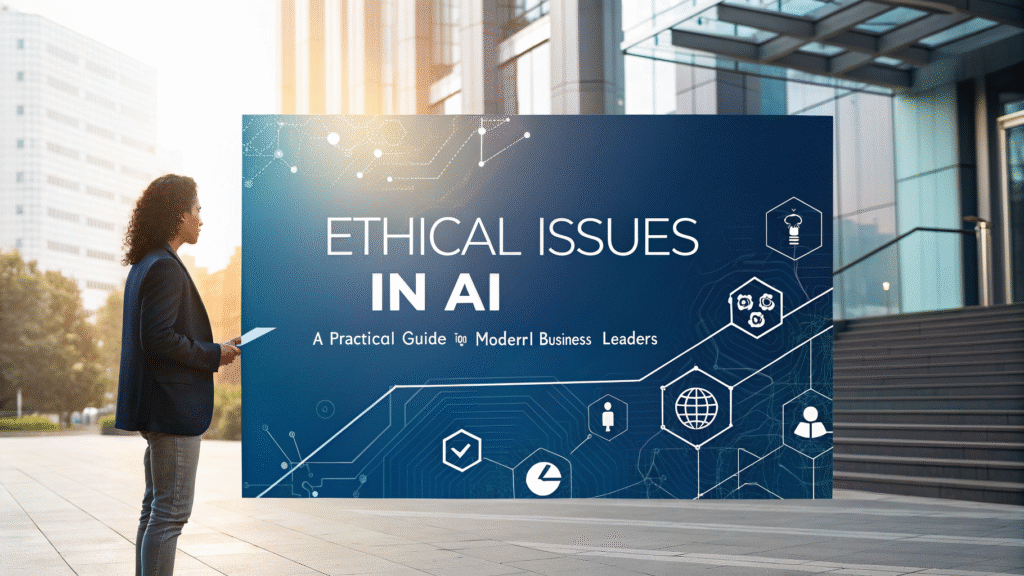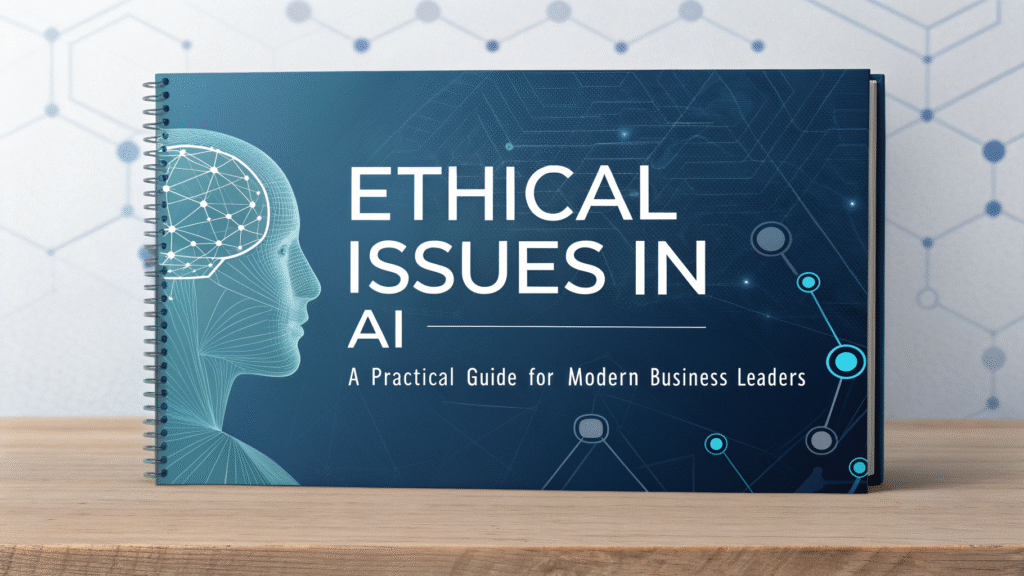
Table of Contents
- Introduction
- History & Evolution
- Audience & Demographics
- Key Features & Functions
- Business & Marketing Potential
- Best Practices & Tips
- Challenges & Limitations
- Future Outlook
- Conclusion
Introduction
Every time you deploy an AI tool in your business, you’re making ethical choices whether you realize it or not. The ethical issues in AI aren’t abstract philosophical debates. They’re daily decisions that affect your customers, employees, and bottom line.
From algorithms that accidentally discriminate to AI systems that invade privacy, these challenges touch every industry. Entrepreneurs and marketers face unique pressure because they’re often the first to adopt new technologies without fully understanding the implications.
This guide cuts through the noise. You’ll learn which ethical issues in AI actually matter for your business, how to spot problems before they damage your brand, and practical steps to use AI responsibly while staying competitive.
The goal isn’t perfection. It’s awareness and intentional decision-making that protects both your business interests and the people you serve.
History & Evolution
Understanding how we got here helps us navigate forward more wisely.
The Foundation Years (1950s-1990s)
Early AI researchers worried about theoretical problems. Could machines think? Should they? These debates stayed mostly academic because AI capabilities remained limited.
The Big Data Era (2000s-2015)
Ethics became urgent when AI started making real decisions. Amazon scrapped a hiring algorithm in 2014 that discriminated against women. Facial recognition systems showed racial bias. Privacy concerns exploded as companies collected massive datasets.
The shift from theory to practice revealed something crucial: AI doesn’t create ethical problems from scratch. It amplifies existing human biases at scale.
The AI Explosion (2016-Present)
Cambridge Analytica showed how AI could manipulate elections. Deepfakes threatened truth itself. ChatGPT raised questions about authorship and authenticity. Autonomous weapons development crossed moral boundaries many considered sacred.
Today, ethical issues in AI dominate boardrooms and regulatory discussions. The stakes are higher because the technology is more powerful and more embedded in daily life.
Audience & Demographics
Different groups face distinct ethical challenges with AI.
Primary Stakeholders:
- Business owners balancing innovation with responsibility
- Marketing teams using AI for targeting and personalization
- Content creators navigating AI-assisted production
- HR professionals implementing AI screening tools
- Consumers whose data powers these systems
Studies show that 67% of consumers worry about companies using their data unethically. Meanwhile, 82% of business leaders feel pressure to adopt AI quickly, even without clear ethical guidelines.
The disconnect is real. Customers want transparency and control. Businesses want efficiency and growth. Bridging this gap requires intentional ethical frameworks.
Age matters too. Younger consumers (18-35) are more likely to abandon brands caught in AI ethics scandals. They expect better from companies they support.
Key Features & Functions
The ethical challenges map directly to AI’s core capabilities.
Data Collection and Use
AI systems require enormous amounts of data. This raises questions about consent, privacy, and ownership. When you scrape public social media posts to train a marketing AI, is that ethical? Where’s the line?
Algorithmic Decision-Making
AI makes or influences decisions about hiring, lending, criminal justice, and healthcare. These decisions affect people’s lives profoundly. When algorithms get it wrong or perpetuate bias, the consequences ripple through communities.
Personalization and Manipulation
AI can personalize content so effectively it becomes manipulative. The line between helpful recommendation and exploitative targeting blurs. Marketing AI can identify vulnerable consumers and push them toward decisions against their interests.
Automation and Labor
AI automates jobs, displacing workers. While this creates efficiency, it raises questions about corporate responsibility to affected employees and communities.
Content Generation
AI now creates text, images, and videos indistinguishable from human work. This challenges concepts of authorship, authenticity, and truth.
Each function brings specific ethical dilemmas requiring thoughtful navigation.
Business & Marketing Potential
Ethical AI isn’t just morally correct. It’s strategically smart.
Competitive Advantages:
Companies known for ethical AI use build stronger customer trust. As a result, they face fewer regulatory penalties. Consequently, responsible practices attract top talent eager to work for ethical organizations. Furthermore, these practices also reduce the risk of PR disasters, which in turn can destroy brand value overnight.
Marketing Applications:
Ethical AI in marketing means respecting user privacy while still delivering personalized experiences. It means transparent data practices. It means targeting based on interest rather than exploitation of vulnerability.
Content Creation Balance:
Using AI to assist content creation boosts productivity. But maintaining transparency, fact-checking outputs, and preserving authentic human voice protects credibility.
Risk Mitigation:
The EU’s AI Act and similar regulations worldwide make ethical compliance legally necessary, not optional. Early adopters of ethical practices avoid costly retrofitting and penalties.
Smart businesses see ethical AI as investment, not constraint. They build competitive moats through trustworthiness in an industry where trust is increasingly rare.
Best Practices & Tips
Implementing ethical AI requires specific, actionable steps.
Establish Clear Policies:
Document your AI ethics principles before deploying systems. Cover data use, transparency, human oversight, and accountability. Make these accessible to your team and customers.
Conduct Regular Audits:
Review AI systems quarterly for bias, accuracy, and unintended consequences. Test with diverse datasets. Involve people from different backgrounds in evaluation.
Prioritize Transparency:
Tell customers when they’re interacting with AI. Explain how their data is used. Make opt-out easy. This builds trust even when technology isn’t perfect.
Maintain Human Oversight:
Never let AI make final decisions on important matters without human review. This applies to content approval, hiring decisions, customer service escalations, and marketing campaigns.
Invest in Training:
Educate your team about AI ethics. Make it everyone’s responsibility, not just the IT department’s problem. Understanding helps people spot issues early.
Choose Ethical Vendors:
When buying AI tools, evaluate providers’ ethical practices. Ask about their training data sources, bias testing, and transparency commitments.
Start Small:
Test AI applications in low-stakes environments first. Learn from mistakes before scaling. This reduces harm from inevitable missteps.
Challenges & Limitations
Even well-intentioned efforts face significant obstacles.
Technical Complexity: Understanding how AI systems make decisions is genuinely difficult. Black box algorithms complicate accountability and correction.
Business Pressure: The race to adopt AI creates shortcuts. Taking time for ethical consideration feels like competitive disadvantage, though it’s actually protective.
Evolving Standards: What counts as ethical AI keeps changing as technology advances. Yesterday’s acceptable practices become tomorrow’s scandals.
Resource Constraints: Small businesses struggle to afford comprehensive ethical AI programs. They need practical, scalable approaches.
Global Variations: Ethical standards differ across cultures and jurisdictions. International businesses must navigate conflicting expectations.
Measurement Difficulty: Quantifying ethics is hard. How do you measure fairness? When is personalization manipulative? These questions lack clear metrics.
These challenges explain why many organizations struggle, but they don’t excuse inaction. Progress beats perfection.
Future Outlook
The ethical landscape of AI will continue evolving rapidly.
Regulatory Trajectory:
Expect stricter AI regulations globally by 2026. The EU leads, but the US, China, and others are developing frameworks. Compliance will become more expensive and complex.
Consumer Expectations:
Transparency demands will increase. Consumers will actively seek out ethically-minded AI companies and punish violators more severely through boycotts and public pressure.
Technology Development:
New tools for detecting bias and ensuring fairness will emerge. Explainable AI will improve, making systems more transparent and accountable.
Industry Standards:
Professional organizations will establish certification programs for ethical AI. These credentials will become differentiators in competitive markets.
Integration with Sustainability:
AI ethics will merge with broader ESG (Environmental, Social, Governance) frameworks. Ethical AI becomes part of comprehensive corporate responsibility.
The organizations that proactively build ethical practices now position themselves advantageously for this future.

Conclusion
Ethical issues in AI aren’t obstacles to business success. They’re pathways to building sustainable competitive advantages through trust and responsibility.
For entrepreneurs, marketers, and content creators, the message is clear: ignoring AI ethics is not an option. The stakes are high—reputational, legal, and financial risks are significant. Even more importantly, using AI ethically helps build a business that attracts loyal customers and top talent.
Start with awareness: Understand that every AI implementation involves ethical choices. Next, establish clear principles, implement oversight mechanisms, and commit to transparency.
The future belongs to businesses that harness AI’s power while upholding human dignity, privacy, and autonomy. This isn’t idealism; it’s a pragmatic strategy for long-term success in an increasingly skeptical marketplace.
Your AI ethics journey starts today. Make it intentional, make it visible, and make it central to your business strategy.